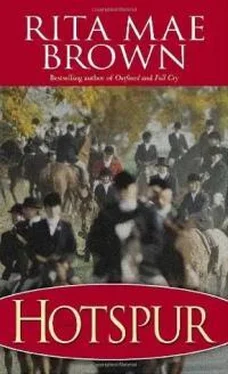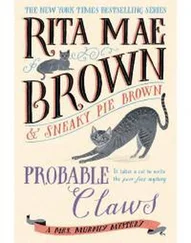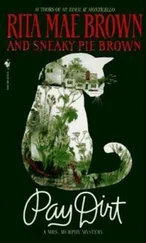“Thought you could take or leave humans,” Raleigh wryly said.
Golly puffed out her chest, showing off her long, silky fur. She was vain about her coat, but then she was vain about everything. “This is hardly the time to mock me, Raleigh. You know perfectly well that I love Sister. I just don’t see the reason to fawn and slobber over her as you do.” Her ears twitched forward. “There they go. Hurry!”
The meet was at eight. It was now seven. As the light changed and the temperature dropped, the first cast time would be pushed from seven-thirty to eight and then finally to nine in the morning, except for the High Holy Days. People needed more time on those days since everyone and their horses had to be perfectly turned out. Braiding manes and tails took a long time on a frosty morning. Fingers ached.
Not that the members of the Jefferson Hunt didn’t sparkle and shine even during cubbing, but braids were not called for, nor silk top hats. And even though it was probably a trick of the mind, brown boots always seemed to clean up faster than black ones.
As soon as the “party wagon” filled with hounds pulled out, followed by the horse trailer, Raleigh and Rooster took off for Foxglove Farm.
Sixty-three people gathered at Foxglove. As hounds were decanted from their trailer, the whippers-in, Betty and Jennifer, stood with them. Members and guests hurried to tighten girths, find hairnets, knock the dust off jackets.
By the time the hounds walked to Cindy Chandler’s graceful stable—with its whiskey barrels filled with mums and baskets of hanging flowers outside, her turquoise and black stable colors painted on each outside beam— everyone was mounted.
Some hunts insisted that staff wear scarlet even during cubbing. At other hunts, staff wore red shirts. And there were those hunts whose staff turned out in tweeds. The Jefferson Hunt staff wore informal kit. After Opening Hunt they would ride exclusively in scarlet even on informal, also called ratcatcher, days.
Although many people erroneously believe there is an absolute standard for hunt attire, in truth, the standard is set by each individual hunt. There was a hunt in Florida, before World War II, that rode in white. Considering the climate, a sensible choice.
As Sister trotted forward to greet the riders, the hounds looked up at her but dutifully stayed with Shaker.
Raleigh and Rooster, who had sped across the sunken meadows, lurked behind the hay barn. Both canines considered their early run just a romp. They were ready for more.
Sybil, curiously, wore an old jacket of Nola’s, a dark blue fabric with rust windowpane woven through it. When her mother commented on it, Sybil said she’d left her lightweight cubbing jacket at her house so she’d grabbed one of her sister’s. All extra coats, jackets, vests, and stock ties were kept in the stable closet at After All. Tedi wondered if Sybil had noticed a missing jacket and derby. Her darker question, of course, was just what did Sybil know?
Ken, too, commented on her attire. Both her mother’s and her husband’s questions irritated her. Half the field was too young to remember Nola’s clothing and the other half had seen her in her sister’s jackets before. She dismissed them and said everyone was too jittery. Ken soothed her by saying how happy he was to be riding in the field with his wife for a change.
“Good morning. Welcome, visitors. I see some friends from other hunts.” Sister smiled. “I’m thrilled to have the senior master of Deep Run with us today, Mary Robertson.”
Mary smiled. “Glad to be here.” She, too, had butterflies.
“I see some friends from Rockbridge Hunt and Glen-more Hunt, Keswick and Farmington. Welcome.” She turned to her hounds. “You children better find Mr. Fox and show everyone good sport.”
“No problem,” Dragon shot off his big mouth.
“God, I hate him!” Asa repeated his leitmotiv, voice low.
“I’d be remiss if I did not thank our hostess today. Cindy Chandler, thank you for allowing us to hunt Foxglove.”
Cindy, immaculately turned out, replied, “My pleasure. Don’t forget the breakfast afterward. There’s fried okra.”
Crawford involuntarily grimaced, which made Sister laugh. Most Northerners couldn’t abide this particular southern specialty.
Tendrils of mist curled through the lowlands. The long rays of the rising sun painted the buildings with scarlet and gold. The temperature was a cool forty-five degrees. It was beginning to feel like hunt season!
Traditionally, the master decides on the first cast. In many hunts, the master isn’t a true hound person and so agrees with whatever the huntsman suggests. Sister, loving her hounds beyond all measure, would sit down with Shaker the night before a hunt and plan the day’s hunt.
Plan your hunt; hunt your plan.
The advantage of this over the years was that each person developed an appreciation for the other’s mind. Sister might suggest going low on a windy day, and Shaker might remind her the muck on that particular bottom would be rough sledding. Try high first even with the wind. They’d bat ideas back and forth, they’d check the humidity, the wind, the temperature. They’d obsessively watch The Weather Channel, then sit down, grumbling that those people knew nothing about the weather hard by the mountains, which could change in the bat of an eye.
They’d devise their plan, rise early in the morning, open their window, or hurry out the front door to check the weather. Had there been a light frost? It would occur up here before it would in town. Did the wind change? What was the speed and direction? If Nature decided to change her clothes overnight, the two of them could alter their plan to suit. Both people were flexible and both were true hunters. They worked with Nature as their partner. People who slaved in air-conditioned offices, drove home in cars with air-conditioning or heated seats, had mostly forgotten that humans don’t control Nature. If she shifts, you shift with her.
Today’s plan was to cast eastward, over the rolling hayfields, past the huge old chestnut. If scent held on the pastures it ought to be a hell of a day. If not, they’d comb through the woods, good trails throughout, and surely hit a line.
They’d go east to the one-room schoolhouse at the edge of Cindy’s property. By then, people and horses would be relaxed. Walter would appear then disappear in the swale before the schoolhouse. Then they would turn northward, making a semicircle until reaching the waterwheel at the twin ponds, one above the other. Mist ought to be thickest there. Melissa and Brandon would be the wraiths of the ponds.
The cast they’d devised kept the wind glancing at them at about a ninety-degree angle up to the schoolhouse. Turning there, hounds would be heading full into the breeze.
“Think they’ll hit?” Raleigh deferred to Rooster, who as a harrier possessed more knowledge of hunting.
“Shouldn’t take long. This place is crawling with foxes.” Rooster lifted his head. “Crawling.”
Inky, sitting in the hayloft, the top door open to keep the hay fresh, looked down. “Didn’t crawl. I climbed.”
“Inky, what are you doing here?” Raleigh liked the small black vixen.
“Well, it’s not like I live that far away. Curiosity got the better of me.”
“Who will give them the first run?” Raleigh asked.
“Yancy. If he poops out, Grace is fishing down by the waterwheel ponds.”
The waterwheel ponds, built by Cindy for practicality and beauty, had a small waterwheel that kept the water moving between the two levels of the ponds. Grace, Charlie’s sister, would fish there for hours.
Читать дальше












